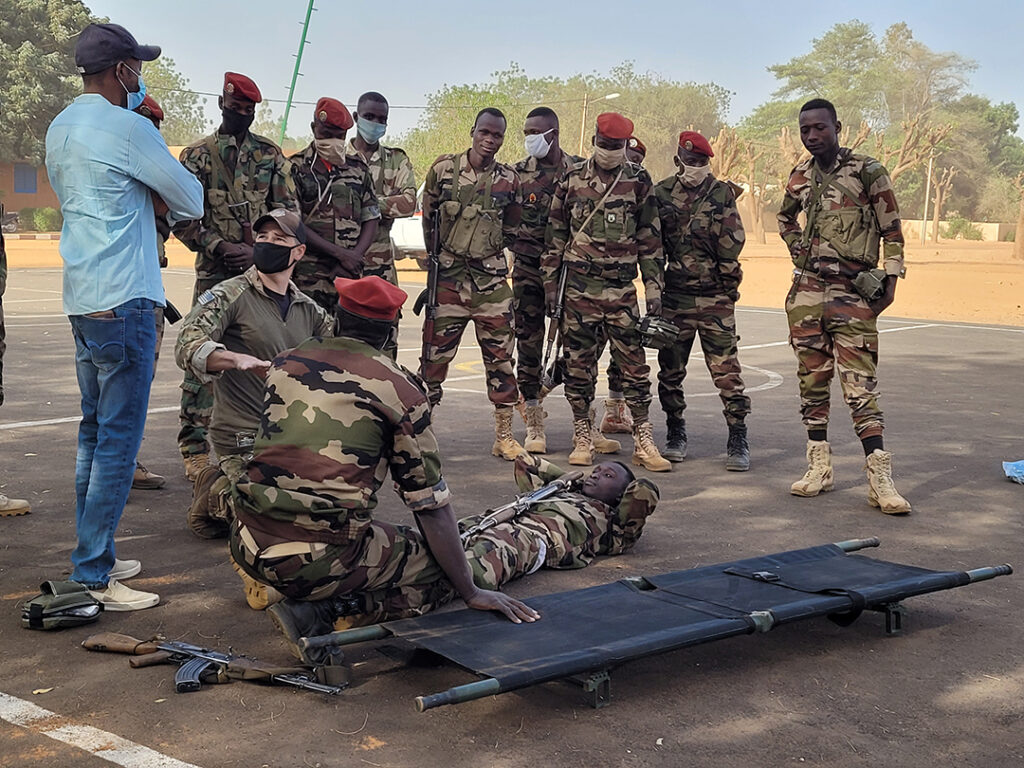ADF STAFF
For Nigerien Armed Forces (FAN) Soldiers operating in remote regions of the country, first aid training can be the difference between life and death.
A United States-led training event helped give Nigerien forces the skills necessary to stabilize wounded Soldiers on the battlefield and move them quickly to a hospital.
In conjunction with FAN’s emergency medicine personnel, the U.S. military distributed individual first aid kits (IFAKs) and conducted a one-day medical readiness training exercise (MEDRETE) at FAN’s base in Niamey for 20 Nigerien Soldiers on January 21, 2021.
“The medical readiness training exercise illustrated the importance for the individual Soldier to be proficient in level one medical tasks,” U.S. Army Capt. Cassandra McDonald told ADF. “We worked on hemorrhage-control techniques, patient hand-offs and casualty-loading techniques.”
McDonald said the MEDRETE, which was funded and facilitated by the U.S. Civil-Military Support Element in Niger, is part of a larger effort to develop basic combat lifesaving skills among FAN Soldiers.
The U.S. military has distributed first aid kits to several FAN units deployed in operations against extremists in the region. The January 21 training was for Soldiers in Operation Saki 2 in the southern Tillaberi region, but the military’s primary focus is Operation Almahaou in northern Tillaberi.
For more than 10 years, terrorism has roiled western Niger. The remote region across the border in Mali has become a lawless home to ISIS and a coalition of extremist groups known as Jama’at Nusrat al-Islam wal-Muslimin (JNIM).
On January 2, suspected Islamist militants killed more than 100 people in Tchombangou and Zaroumdareye. In response, FAN escalated Operation Almahaou and mobilized troops to secure threatened villages near the border.
The area where Niger borders Mali and Burkina Faso, known as the Liptako-Gourma region, is arid and hilly. Remote villages are easy targets for cross-border attacks, but the distance requires FAN forces to be spread thin.
The difficulty of those missions are what made the MEDRETE so vitally important, according to U.S. Army Sgt. Jordan Banks, a medic who helped lead the training. In particular, he said training with the first aid kits, which are sourced locally, allows Soldiers to provide medical attention to the injured while in combat.
“The contents of the Nigerien IFAKs were specifically selected to address the most preventable cause of battlefield death — bleeding from the extremities,” he told ADF. “I have no doubt the training and material support this exercise provided will directly increase the survivability of Soldiers in contested areas across Niger.”
McDonald called the MEDRETE one of many examples of the U.S. commitment to support the security of Nigeriens.
“This event enhanced U.S. and Nigerien armed forces relations,” McDonald said. “We built upon the medical proficiency of Soldiers deploying in support of operations against ISIS and JNIM, and that will increase survivability by providing Soldiers with the necessary supplies to treat their fellow Soldiers on the battlefield.”

